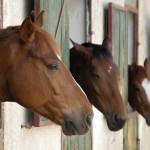Canadian Horse Industry Study Shows Current Trends

The 2010 Canadian Horse Industry Profile Study was commissioned by Equine Canada and involved responses from well over 2,500 adults directly involved with horses. The respondents were chosen from all Canadian provinces as well as the northern territories. Alberta and Ontario accounted for more than half the horses in the country, with Quebec and British Columbia combining for another quarter of the population. Less than 1% of Canada’s horses are found in the Yukon and Northwest Territories.
The survey showed that the number of horses in Canada was lower in 2010 (963,500 horses on 145,000 properties) than in 2005 (1,092,461 horses). Sport, recreation, and breeding each claim about 18% of the mature horses. Participation in equine activities has seen a shift in the past several years: in 2003, 40% of riders were adults and 60% were children, while in 2010, 59% of all riders were adults.
Baby-boomer equine enthusiasts—those who are 60 years old or above—make up nearly a quarter of the country’s horse owners. This trend may point to a decline in overall participation in equine activities as this population ages. Of all respondents to the survey, fewer than 20% expect to own more horses five years from now than they do at the present time.
The horse industry supported over 154,000 full-time jobs and contributed more than $19.6 billion to Canada’s economy in 2010. Direct spending by owners on products and services for their horses totaled $1.6 billion per year. Cost of keeping a horse rose from $1,500 per year in 2003 to $2,700 in 2010. In general, expenses in all facets of horse ownership have increased, particularly insurance and fees for entering shows and other competitions.








